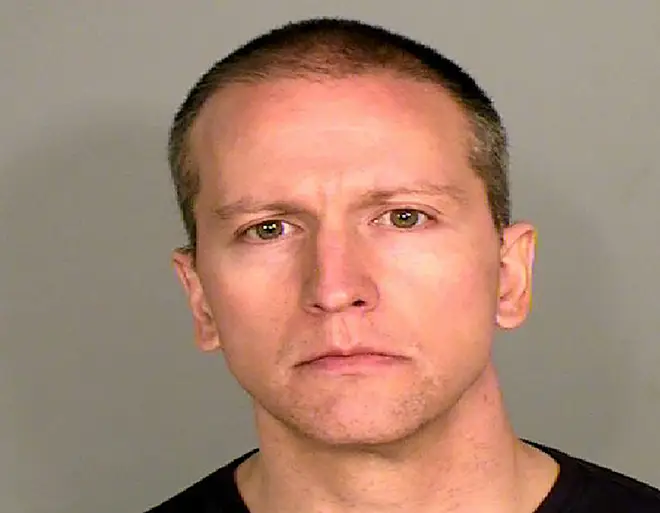
Oli Dugmore 4am - 7am
3 June 2020, 19:51

Former police officer Derek Chauvin is to be charged with second-degree murder over the death of George Floyd in Minnesota.
The three other officers who were present at the tragic death of the 46-year-old are also to be charged separately with aiding and abetting murder.
Minnesota's Attorney General Keith Ellison will "elevate the charges" against the former Minneapolis police officer, who was filmed kneeling on Mr Floyd's neck for almost nine minutes on 25 May.
His death has sparked mass protests and, in some cases, looting in the US, while demonstrations against police brutality and racism have spread across the globe.
There was an angry clash between police and protesters at the London Black Lives Matter protest on Wednesday, where a police officer appeared to be punched in the face after being confronted by one of the crowd.
Mr Ellison's office did not respond to questions about the charges.
Minnesota Attorney General @keithellison: "Today, I filed an amended complaint that charges former Minneapolis police officer Derek Chauvin with murder in the 2nd degree for the death of George Floyd."
— CSPAN (@cspan) June 3, 2020
Full video here: https://t.co/MCWQXN84W3 pic.twitter.com/2JVhzRgK1E
Minnesota Attorney General Keith Ellison is increasing charges against Derek Chauvin to 2nd degree in George Floyd’s murder and also charging other 3 officers. This is another important step for justice.
— Amy Klobuchar (@amyklobuchar) June 3, 2020
The news of the new charge for Chauvin was first reported by the Star-Tribune, who cited unnamed sources, before US Senator Amy Klobuchar of Minnesota confirmed it.
Writing on her Twitter profile, the US politician said: "Minnesota Attorney General Keith Ellison is increasing charges against Derek Chauvin to 2nd degree in George Floyd’s murder and also charging other 3 officers.
"This is another important step for justice."
A second-degree murder charge would mean that there was intent in the killing of Mr Floyd, but would not mean it was premeditated or planned in advance.
Officer Derek Chauvin was fired on May 26 and initially charged with third-degree murder and second-degree manslaughter. The three other officers were also fired but were not immediately charged.

Mother of George Floyd's daughter: I want justice for him
Mr Ellison upgraded the charge against Chauvin to unintentional second-degree murder.
He also charged Thomas Lane, J Kueng and Tou Thao with aiding and abetting second-degree murder and second-degree manslaughter.
Lawyer Earl Gray, who represents Lane, told The Associated Press that the Star Tribune's initial report about the charges was accurate, before ending the call.
Before news of the upgraded charges, a lawyer for Chauvin said he was not making any statements at this time.
Lawyers for Thao and Kueng did not return messages seeking comment on the charges.
Benjamin Crump, a lawyer for Mr Floyd's family, called it "a bittersweet moment" and "a significant step forward on the road to justice".
Mr Crump said Mr Elison had told the family he would continue his investigation into Mr Floyd's death and upgrade the charge to first-degree murder if warranted.

Keir Starmer: George Floyd's death “shone a light” on racism
Mr Floyd's family and protesters have repeatedly called for criminal charges against all four officers as well as more serious charges for Chauvin, who held his knee to Mr Floyd's neck.
Some of the rockiness of the days since Mr Floyd's death May 25 dissipated on Tuesday night, with demonstrations continuing around the country, but without major reports of violence.
Curfews and efforts by protesters to contain earlier flare-ups of lawlessness were credited with preventing more widespread damage to businesses in New York and other cities overnight.
"Last night we took a step forward in moving out of this difficult period we've had the last few days and moving to a better time," New York mayor Bill de Blasio said.
New York police said they arrested about 280 people on protest-related charges on Tuesday night, compared with 700 a day earlier.
Nationwide, the number arrested in connection to the unrest rose to more than 9,000.
At least 12 deaths have been reported, though the circumstances in many cases are still being sorted out.
Some tense incidents continued Tuesday night, but were far less prevalent than in preceding days.
Police and National Guard troops used tear gas, flash-bang grenades, nonlethal rounds and other means of dispersing crowds near a police precinct in Seattle, near Centennial Park in Atlanta and at demonstrations in Tampa and St Petersburg, Florida.